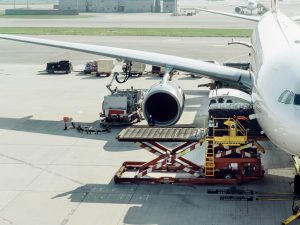Cathay Cargo has appointed Zeal Global Corp as its General Sales Agent (GSA) in India, marking a significant step in expanding its operations and market presence across the country. This strategic partnership is set to enhance Cathay Cargo’s reach into India’s Tier 2 and Tier 3 cities, strengthening its position as a leading air cargo carrier in one of the world’s fastest-growing logistics markets. This collaboration will focus on key regional markets across India, expanding Cathay Cargo’s presence in Ahmedabad (AMD), Jaipur (JAI), Ludhiana (LUH), Allahabad (AIP), Amritsar (ATQ), Lucknow (LKO), Kanpur (KNU), Cochin (COK), Trivandrum (TRV), Coimbatore (CJB), Madurai (IXM), and Varanasi (VNS). By tapping into these key manufacturing and emerging logistics hubs, Cathay Cargo aims to provide enhanced market access and seamless cargo solutions to businesses across India.
Read More »NHLMS, IWAI sign MoU to build MMLP in Varanasi
National Highways Logistics Management Limited (NHLML) and Inland Waterways Authority of India (IWAI) signed MoU to develop multimodal logistics park (MMLP) in Varanasi, Uttar Pradesh. The agreement was signed in the presence of Union Minister of Road Transport and Highways, Nitin Gadkari and Union Minister of Ports, Shipping and Waterways, Sarbananda Sonowal. The 150-acre park is strategically connected to NH7 via a 650m access road and is just 1.5 km from the NH7-NH2 junction. It will seamlessly integrate with the Eastern Dedicated Freight Corridor through a 5.1 km railway line from Jeonathpur Station and National Waterway-1 and is located 30 km from Lal Bahadur Shastri Airport. The project promises significant investment and employment opportunities, strengthening India’s logistics sector, enhancing trade efficiency, and driving economic growth. This initiative is a testament to India’s commitment to developing its logistics sector and reinforcing its position as a global economic powerhouse.
Read More »Bharat Drone Manthan by PHDCCI focused on advancing drones towards Viksit Bharat
The PHD Chamber of Commerce and Industry (PHDCCI) organised Bharat Drone Manthan 2.0 in New Delhi focusing on Advancing the drone ecosystem towards Viksit Bharat. The experts focused on investing in drones manufacturing and technology to boost logistics efficiency, skilling and last mile deliveries. They also stressed upon creating an ecosystem in India for drones, by empowering startups, drone manufacturers and IT professionals. Piyush Srivastava, Senior Economic Advisor, MoCA and Shekhar Dutt, Member IIPA and Former Governor, Chattisgarh graced the event as guest of honours. The key focus areas included evolving futuristic drone technology and current policy landscape, impact of drones on defence sector, drones manufacturing, innovation and R&D, capacity building, etc. Industry experts also participated in drones exhibition and engaged in insightful discussions. Experts from various sectors like tourism, IT, MSMEs and logistics participated.
Read More »DP World Mundra begins 1st service connecting India & US East Coast
DP World has invested in Mundra as a gateway for global commerce with trade links further strengthened by the first port call of the vessel M.V. MAERSK ATLANTA early this month. The MECL service’s port connectivity includes Houston, Norfolk, Newark, Port Tangier Mediterranean, Salalah, Jebel Ali, Salalah, Charleston North and Savannah. This service will enhance transit times, boost bilateral trade, drive economic growth, and encourage business collaboration within these regions. It will benefit Indian industries such as handicrafts, ready-made garments, textiles, machinery components (OEMs), pharmaceuticals, and chemicals, which have strong demand from the U.S. East Coast. Commenting on this significant milestone, Ravinder Johal, Chief Operating Officer, Ports & Terminals, Operations & Commercial, Middle East, North Africa & Subcontinent, DP World, said, “Efficient maritime routes and robust port operations are vital to supporting India’s expanding role in global trade and strengthening its trade partnerships. DP World Mundra is committed to fostering and strengthening trade connectivity between India and the world. The introduction of the MECL service marks a significant step forward, bolstering bilateral relations, improving direct trade connectivity, and driving economic growth for businesses across these regions”. Supported by DP World’s global network, multimodal expertise and Mundra terminal’s seamless connectivity to India’s road and rail networks, customers across Gujarat, Haryana, Delhi, Punjab, Uttar Pradesh, Rajasthan, and Himachal Pradesh can now utilize the MECL service for efficient cargo movement. With a 632-meter quay, deep draft for large vessels and a 50-acre container freight station supported by dedicated rail connectivity, DP World Mundra prioritises seamless cargo movement to make global trade flow. The introduction of the MECL service, offering access to the U.S. East Coast, further solidifies Mundra’s role as a vital gateway for Indian …
Read More »Over 63% global warehouse operators rely on automation to ensure safety: Study
According to Zebra Technologies’ latest Warehousing Vision Study titled, ‘Elevating Every Move: The Formula for High-Performance Warehousing’, in 2024, India’s total warehousing stock has reportedly surpassed 500 million square feet, making the safety of frontline employees a critical focus alongside operational efficiency. As safety emerges as a top priority, automation tools are increasingly recognised as essential not only for optimising operations but also for safeguarding workers. The frontline workers clearly communicated the benefits of automating warehouse operations – and the risks of not automating fast enough. According to the study, 63% of global warehouse leaders plan to implement both artificial intelligence (AI) software (63% in APAC including India)and augmented reality (AR) (65% in APAC including India) within five years. In addition, 64% surveyed globally plan to increase spending on warehouse modernization in the next five years, with APAC leaders including India at 63%. Meanwhile, 63% plan to accelerate their modernization timelines by 2029, similar to 64% in APAC including India.
Read More »CONCOR, Teri ink pact to boost green logistics operations
Container Corporation of India Ltd (CONCOR) has joined forces with The Energy and Resources Institute (TERI) to drive advancements in sustainable logistics. The two organisations signed MoU to establish the CONCOR-TERI Centre of Excellence for Green and Sustainable Logistics. The initiative aligns with India’s environmental and economic sustainability goals and marks a significant step toward reducing the environmental impact of logistics operations. The partnership was formalised during the World Sustainable Development Summit (WSDS) 2025 at the India Habitat Centre in New Delhi. By combining CONCOR’s expertise in logistics with TERI’s research in sustainability, the centre aims to pioneer innovative solutions for green logistics management. This collaboration underscores India’s commitment to environmentally responsible supply chain practices.
Read More »Express cargo may decline, despite 4% surge in demand: Xeneta
Figures released by data provider Xeneta indicates that in February air cargo demand increased by 4 per cent year on year, the dynamic load factor was flat at 59 per cent and the average spot freight rate was up 10 per cent to $2.53 per kg. However, Niall van de Wouw, Chief Airfreight Officer at Xeneta said that there was also a ‘taste of what’s to come’ with strict rules for e-commerce shipments when rates from Shanghai to the US fell by 29 per cent month on month in February to $3.23 per kg. Van de Wouw said that Shanghai was likely to be the origin to first see the impact of lower e-commerce volumes. “Even allowing for the earlier Lunar New Year and the seasonal e-commerce slowdown at the start of the year, the fall in Shanghai-US spot rates, following the temporary removal of the de minimis exemption on Chinese shipments, may be one of the first indicators that the regulatory/political conversations are starting to affect the air cargo market,” he said. “If a fall in e-commerce volumes means there’s currently more available capacity to do business out of Hong Kong and southern China again, we would expect Shanghai to be the first market to feel this impact, and that’s what we saw in February. This may be short-term, but the uncertainty around e-commerce is impacting the market.”
Read More »SF Airlines begins operations in BLR with B767-300F
SF Airlines officially touched down in Bengaluru on March 6, 2025, with its B767-300 freighter, marking a new milestone in India’s air cargo landscape. The airline will operate a weekly freighter service (EHU-BLR-EHU) with WFS BLR, a SATS Group member, as its trusted cargo handler. The inaugural flight was welcomed with a special ceremony as WFS efficiently handled both import and export cargo. This latest SF-WFS collaboration at BLR strengthens their growing network across multiple stations. With increased freighter capacity, SF Airlines’ entry into BLR will significantly boost imports and enhance connectivity for businesses. A new era of air cargo expansion begins!
Read More »ESR opens EVs charging station at MMLP in Taloja
ESR Group has launched its first integrated Electric Vehicle charging infrastructure at its 89-acre Grade A Taloja Industrial and Logistics Park in India. The new EV charging station is fully powered by renewable energy generated by ESR’s rooftop solar panels mounted on the charging station itself. This initiative aligns with ESR’s Environmental, Social and Governance (ESG) 2030 Roadmap to decarbonise and drive sustainability in the Company’s operations – paving the way for a cleaner, more sustainable logistics transportation system in Maharashtra and supporting the Government of India’s plan to achieve net zero emissions by 2070. The EV charging station can charge up to 10 EVs and a variety of EV models simultaneously, catering to the different needs of businesses and tenants across ESR Taloja’s 14 buildings spanning 1.9 million square feet (over 175,000 square metres) of space. Six of these charging stations rated at 7.4 kilowatts (“kW”) are designed for four-wheelers, while the remaining stations rated at 3.3kW are for two-wheelers.
Read More »‘Entrants must be trained in technical & non-technical areas’
Alpana Chaturvedi, CEO, My Logistics Gurukul said, “In addition to understanding documentation, processes in logistics, new entrants to the industry need to be skilled in technical and also non technical areas. They need to be familiar with various automation softwares, AI tools and other technology that are being used in the industry. Besides these they need to have very good communication, verbal and written skills, with an enhanced focus on Customer Service skills.”
Read More » Cargo Breaking News
Cargo Breaking News








